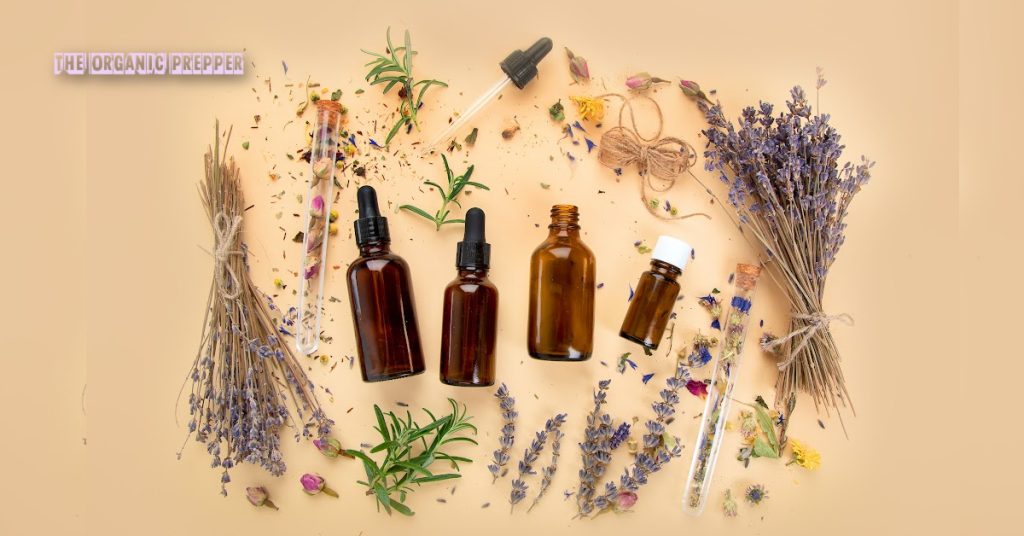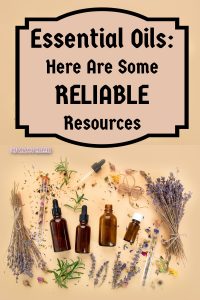If you're new here, you may want to subscribe to my RSS feed. Thanks for visiting!
Essential oils are incredibly popular, but there are a lot of wild claims out there, both about the powers of essential oils and the quality of different products. There is so much inaccurate information out there that Daisy refuses to sell them.
So how do we evaluate a given company’s oils? How can we avoid the expensive snake oil sellers in favor of the good stuff? Are these oils safe for the furry family members? And how can we make our own? This article will answer all of these questions, but remember: we here at The Organic Prepper don’t give medical advice! If you have specific questions or a condition you think could be treated in this way, ask your doctor. If your condition is immediately life-threatening, you shouldn’t be reading blogs on the computer. Call 911 or go to the ER!
The history of essential oils
Essential oils have been used for centuries for various purposes. Basically, these oils are concentrated plant extracts. According to Lebermuth, the first use of essential oils is believed to be in prehistoric cave paintings. Egyptians used them for both adornment and in various forms for both medical treatment and spiritual ceremonies. Cleopatra’s beauty is attributed to spa treatments that used oils and Dead Sea salt.
These oils are used in Ayurveda, an ancient Indian healthcare system, and are mentioned in both the Old and New Testaments of the Bible.
What about the use of essential oils on or around pets?
First of all, whether or not an essential oil is safe for the fur kids depends upon the oil and the species. The Cabbage Town Pet Clinic gives lists of specific oils that are outright toxic to dogs and cats. They also give a list of symptoms to look for. If your fur kid develops any of these symptoms, head directly to the vet and take a bottle of the oil with you, if you know what they’ve been exposed to.
Essential oils can also be toxic to horses, cows, and goats. Research is your friend! Before deciding that aromatherapy is the answer, ask your vet or at least a good search engine. The ASPCA also has a searchable list here
With the big money involved, how do you know what products to use?
Essential oils have a huge market share in this country, estimated at $4.6 billion dollars in 2022. Healthline gives a great summary of what these oils are, how to choose them, and a few caveats regarding safety and side effects here.
When it comes to evaluating the product, it pays to look at how any given site performed the evaluation.
For example, Consumers Advocate does some incredibly in-depth reviews. Their reviews include actual lab testing using GC-MS, gas chromatography/mass spectometry to test for adulteration, a common practice in the essential oils industry.
They also looked at the methods used by specific companies to educate consumers and how easy it was to find the safety information, as well as how a product is sourced. Sustainable sourcing is held to indicate more ethical business practices. There are many companies blogging about protecting the consumer. I would suggest that a greater depth of investigation lends itself to a higher credibility of opinion.
How about a given company’s marketing practices? Are they suggesting that by using their product, your life will be trouble-free? For example, adventuring outdoors freely using their sunscreen without mentioning, even in the fine print, that sunscreen needs to be reapplied often, especially after swimming. Since most essential oils are not to be ingested, is the company suggesting that you do so? Is the company attempting to upsell you on additional services, such as time with a consultant or an MLM? Is the founder listed on QuackWatch, or has that person been the subject of several investigations? All of these things would make me cautious towards their products.
Can you make your own essential oils?
When it comes to making your own, there are many options. Making your own is almost always cheaper, plus there are no worries about adulterations or sourcing.
Nourished Essentials discusses how the oils are made commercially, what plants can be made into essential oils, and how to do it, including an equipment list. Spoiler: all you need is a crock pot with a lid, distilled water, and plant material. Countryside Journal gives a stove top method. Chemistry Cachet gives a recipe for a cheap and easy-to-make bug spray using witch hazel, lemon, and citronella. Doesn’t that beat the tar out of Deet?
 Essential oils and the garden
Essential oils and the garden
And why not grow your own plants while you’re at it? I have lavender growing in my yard. How about chamomile, lemon balm, mint, and sage? Bob Vila gives a great plant list for an aromatherapy garden here, and I’m sure there are a great many more! Be sure to check your list for animal toxicity though, as noted above. Eucalyptus oil, for example, is toxic to both dogs and cats.
How about using essential oils IN the garden? The Free Range Life gives several applications, along with recipes, here. Again I remind you: tea tree oil is toxic to both dogs and cats! It’s bad enough to lose your own fur baby. Picking up dead strays for disposable isn’t my idea of fun either!
You’ve got some reading to do!
So that’s the general scoop on essential oils! We hope you found these resources interesting.
Do you use essential oils? If so, how? What is your favorite use? And do you make your own? Please share your experiences in the comments section.
About Amy Allen
Amy Allen is a professional bookworm and student of Life, the Universe, and Everything. She’s also a Master Gardener with a BS in biology, and has been growing food on her small urban lot since 2010.

















12 Responses
Eucalyptus essential oil is highly toxic to people when used topically. This may cause neurological symptoms including headaches, numbing, dizziness, etc.
Whaaat?!? I’ve been using for years with no problem. Eucalyptus & camphor are in certain topical creams for pain with no issues (unless you are allergic of course). Some oils are highly problematic for animals when used on contact & diffused in the home. But oils are FAR safer than spraying febreeze, glade or using a plug in for ‘fresh’ air. And they are therapeutic in nature.
You must research the company’s website & they should provide a certificate seal if it’s truly third party tested they should be proud of that. I have used Revive essential oils for years because it can be ingested (I don’t want to worry about which brand I can put in my mouthwash & which one I can’t).
Please don’t buy into the lie that essential oils are like supplements & should be avoided. That’s just another lie from big pharma.
My husband and I have been using EO’s daily for about 8 years. The brand we use is sustainably sourced and helps struggling farmers and their communities worldwide. My husband had the beginnings of arthritis in his hands and, with daily application to the joints, the swelling went down and the pain disappeared, to the point that he can split wood by hand. With my paralysis and disability, I have a lot of pain but take no pain medication, due to the use of oils. The company is MSM, but you can also just buy a yearly membership (like big box stores) and get 25% off every order. We also take their multivitamins and have never felt better. Our doctor said these are very good vitamins. We do have a dog and are very careful and don’t diffuse much. I am a firm believer.
i would like more info about the vits and oil company pls. theoldbat57 at gmail
ty
be careful of quackwatch.org
Single essential oils are always problematic for pets, no matter the brand. Why don’t you research the essential oil blends produced by a veterinarian and veteran essential oil user/certified aromatherapist – animalEO.
I am sorry but I have been using single essential oils on pets (I have researched it thoroughly for safety of which ones can be used). The problem with animalEO is that she charges and arm and a leg for a small bottle. When I have been referred to a few of her oils, it costs 69 dollars for less than .5 of an ounce. I think that could charge less and reach more people and still make a profit (my opinion only). I use aura cacia oils consistently with no problems for me and my dogs.
That’s an insane price. I’d research her process of distillation. If it’s the same as others that can be ingested (cheap store bought usually cannot be), then I can’t understand why you wouldn’t be able to use on pets (within reason of course).
We also shouldn’t be spraying our yards for insects & weeds if we have pets but that doesn’t stop some. Then they over react when it comes to itty bitty drops of a natural oil?! Ugh, I find the cherry picking irritating don’t you?! 😉
I use lemon, lime, cinnamon, clove and a few others and I DO spray where pets are. Dogs, cats, even racoons do not like the smell and if you have the right mixture, they can smell that stuff a mile away and never come near it. I have been using my own concoction for over 10 yrs, no animals have died but this old lady? NO MORE PISS OR POOP on my side, on my curb or directly on my garage and right outside it.
Inconsiderate slobs who let their pets go anywhere.
A company I use is Edens Garden but Rocky Mountain Oils are great and I have used them on and off for years…
I use them religiously, esp lavender. However, IF you know where to source them from and HOW to use them, they are fantastic for skin cancer. I have taken photos while my face is healing but I do not have actual service on my phone or I would show all of you what my face looks like. I have used EO for over 20 yrs. Yes, they get a bad wrap but it really depends on how you use them, who makes them, the quality of them, etc..
I will say that even the cheap NOW brand for things like clove, cinnamon for cleaning and killing bugs.. works!! They are much cheaper than Doterra and a couple of the other ones….!
Check out Doc Jones at https://homegrownherbalist.net/
Not affiliated, just really like him. He has tons of useful videos on YouTube and specializes in herbal treatment of animals. Plus, he’s a real hoot.